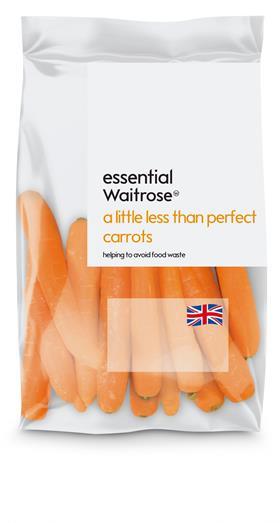
Are you aware of growers asked to programme in ‘wonky’ produce?
Andy Clarkson: We aren’t programming in wonky potatoes as a new line, but we are able to supply product to fulfil some of this demand. Our aim is to grow and pack first-class potatoes for our customers and shoppers to enjoy, but as potatoes are a natural product, we do end up with an amount of misshapen potatoes. We ultimately cannot control the final tuber sizes that the plants produce. The wonky potatoes we currently supply aren’t grown to order, but are taken from the existing crop we have. We have not and will not be encouraging growers to produce anything other than primary grade one quality material, and we will continue to do ongoing work as a business and industry to develop new production methods that reduce waste and improve the yields of primary produced potatoes.
Rob Hull: I’m not aware of it getting programmed as wonky, but blemished fruit is certainly hitting the shelves. I believe this is a result of growers exploring alternative markets for more of their produce. At Farmcare we work to stringent customer specifications, and the biggest challenge for any grower is having a market for 100 per cent of their produce. The trend for wonky fruit and veg gives the opportunity to market the produce that naturally falls outside of tolerances: but it will be dependent on season and the quality available.
Do the returns from wonky produce justify the effort?
AC: Our aim is to maximise the return from the full crop that we grow, and to use as much as possible, with zero wastage. We make little margin from outgrade potatoes regardless of whether they’re packed into wonky packs or subsequently delivered onwards for further processing. The opportunity from wonky veg gives us another avenue and opportunity for these potatoes. The key will be for retailers to react if sales take off, and if there isn’t enough material to meet demand, which is likely to happen at certain times of the year.
Is this trend for wonky produce a passing fad?
AC: The trend appears to be gathering support, and shoppers are now becoming more accustomed to making wonky veg a considered purchase. As little as 12 months ago many shoppers would have overlooked these packs in favour of the more uniform lines. As shoppers have grown to realise that they aren’t compromising on taste and flavour but can potentially make some savings against their shopping bills, this has caused the change. As long as the quality of the end product remains good and shoppers are receiving good value for money, this suggests that the trend is here to stay.
RH: I believe so. The industry needs to work with customers to ensure all saleable produce is sold.
Could the trend lead to retailers scrapping or reducing their cosmetic standards?
AC: Retailers will always keep their own specifications for each variety and tier of potatoes that they list and there will always be a place for this. The fact that the retailers are embracing the trend is a good move and means that they too are listening both to the shopper and maximising the potential from their produce partners.
RH: The current trend for wonky may well pave the way for more tolerance from customers. Supermarkets play a big part in shaping consumer expectations. Over the years, consumers have been programmed to expect a straight carrot, for example, but if supermarkets are brave enough to stock produce shaped by Mother Nature, they can influence consumer expectations, and that’s a win-win for everyone.



